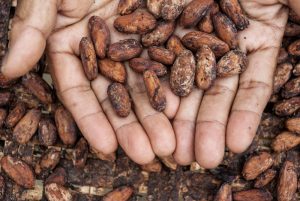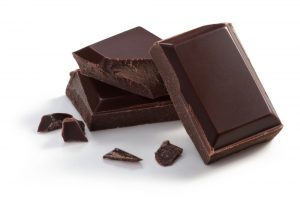Choc-full of benefits – Dawn Woodward Curaprox UK
Featured Products Promotional FeaturesPosted by: Dental Design 24th October 2019

Of all the confectionery in the world, chocolate is arguably the most loved. As a nation of chocoholics, it is unsurprising that we Britons dedicate a whole week every year in October to indulging our sweet tooth and celebrating the wonder that is chocolate. Research by Mintel has revealed that nearly one in six Britons eat chocolate every day, while a similar number do so four to six times a week.[i]The UK is also top of the charts as the country that consumes the most chocolate of any other, but where exactly did our love affair with chocolate originate from?[ii]
From bean to bar
 The practise of making chocolate dates back thousands of years. It is produced from the cacao beans of pods that grow from theTheobrama cacao– a tropical tree (whose scientific name translates to “food of the gods”) that is native to Central and South America, but is also now widely cultivated in West Africa. The Olmecs of ancient Latin America were almost certainly the first to turn the cacao bean into chocolate, although not as we know it today. They roasted and ground the beans into powder, which was mixed with fluids for use as a ceremonial drink and as medicine. Historians believe this knowledge was passed down to the Mayans, who praised chocolate as a gift from the gods. Cacao beans became so valuable that they were prized above gold and traded as currency among the Aztecs.[iii]
The practise of making chocolate dates back thousands of years. It is produced from the cacao beans of pods that grow from theTheobrama cacao– a tropical tree (whose scientific name translates to “food of the gods”) that is native to Central and South America, but is also now widely cultivated in West Africa. The Olmecs of ancient Latin America were almost certainly the first to turn the cacao bean into chocolate, although not as we know it today. They roasted and ground the beans into powder, which was mixed with fluids for use as a ceremonial drink and as medicine. Historians believe this knowledge was passed down to the Mayans, who praised chocolate as a gift from the gods. Cacao beans became so valuable that they were prized above gold and traded as currency among the Aztecs.[iii]
Reports differ but it is thought that the cacao bean was later discovered by Spanish explorers, who brought them back to Europe to create hot chocolate drinks. The rest, as they say, is history. The cacao bean is now commonly used for mass-producing highly refined chocolate and although it remains incredibly popular, chocolate has received a lot of bad press over the years for its potentially negative effects on general health. In fact, the excess consumption of chocolate with a high fat and sugar content has long been associated with weight gain, diabetes, coronary heart disease, and hypertension – among other conditions. Some chocolates can also contain high levels of cadmium and lead, which are toxic to the kidneys, bones, and other body tissues.[iv]
It’s not all bad news…
Despite the health risks posed by chocolate, researchers have begun to uncover new evidence that chocolate can also offer numerous health benefits. Cacao beans themselves are full of antioxidants, including tannins, flavanols and polyphenols that help to neutralise free radicals and prevent oxidative stress on the body. Cacao beans are also rich in minerals such as iron, copper, magnesium, zinc and phosphorous.[v],[vi]Experts speculate that these naturally-occurring substances could aid in the prevention and control of cardiometabolic diseases. Interestingly, a recent meta-analysis of chocolate’s effects on diabetes, stroke and coronary heart disease concluded that moderate chocolate consumption is associated with a reduced risk of developing these conditions.[vii]
Other research shows that chocolate could improve cognitive performance. According to one study, the taste and smell of chocolate may interact with neurotransmitters in the brain – including dopamine, endorphins and serotonin – that contribute to appetite, reward and mood regulation, which is why many people often feel good when eating chocolate.[viii]Another study found that chocolate consumption might even lower the risk of cognitive decline in older people. Researchers assessed nearly 400 Portuguese citizens over the age of 65 and discovered that those who ate a moderate amount of chocolate (an average of one chocolate snack per week) decreased their risk of cognitive decline by 40% over two years.[ix]
The dark tooth
 Some studies suggest that dark chocolate could be effective at protecting the teeth and gums from disease. This is because dark chocolate often contains a higher cacao bean content than milk or white chocolate, equating to a greater number of antioxidants. In fact, some dark chocolates contain far more antioxidants than green tea and red wine.[x]These natural chemicals possess anti-microbial and anti-inflammatory properties that can neutralise bacteria – including those that can result in bad breath – and limit their growth, preventing them from adhering to the teeth and converting sugar into acids that can cause dental caries.[xi]Although compelling, these finding do not necessarily justify consuming larger quantities of chocolate, especially as most chocolates contain various ingredients that can be harmful to the body.
Some studies suggest that dark chocolate could be effective at protecting the teeth and gums from disease. This is because dark chocolate often contains a higher cacao bean content than milk or white chocolate, equating to a greater number of antioxidants. In fact, some dark chocolates contain far more antioxidants than green tea and red wine.[x]These natural chemicals possess anti-microbial and anti-inflammatory properties that can neutralise bacteria – including those that can result in bad breath – and limit their growth, preventing them from adhering to the teeth and converting sugar into acids that can cause dental caries.[xi]Although compelling, these finding do not necessarily justify consuming larger quantities of chocolate, especially as most chocolates contain various ingredients that can be harmful to the body.
Consumers are still advised to select high quality chocolate products and, more importantly, to consume them in moderation. Chocolates that contain a cacao percentage of 70% or higher are recommended in order for consumers to maximise on their general and oral health benefits. To further limit the risk of dental disease, it also remains vitally important for patients to follow good oral hygiene practises using the most reliable products. Curaprox offers the Be You range of toothpastes, the ultra-soft CS 5460 manual toothbrush and CPS interdental brushes, which facilitate gentle but effective cleaning of teeth and gums.
Chocolate is the ultimate comfort food, so it’s no wonder that we love it so much. As we approach National Chocolate Week, it is important to remember that while it may be tempting to overindulge on chocolate, like any food, it should always be consumed in moderation. This is key to ensuring we can all enjoy the sweet treat without harming our long-term health and wellbeing.
For more information please call 01480 862084, emailinfo@curaprox.co.ukor visit www.curaprox.co.uk
References
[i]Mintel. (2014) Nation of chocoholics: Eight million Brits eat chocolate every day. Link: https://www.mintel.com/press-centre/food-and-drink/nation-of-chocoholics-eight-million-brits-eat-chocolate-every-day. [Last accessed: 20.06.19].
[ii]Mintel. (2018) A feast of innovation: Global Easter chocolate launches up 23% on 2017. Link: https://www.mintel.com/press-centre/food-and-drink/a-feast-of-innovation-global-easter-chocolate-launches-up-23-on-2017. [Last accessed: 20.06.19].
[iii]History. (2018) History of Chocolate. Link: https://www.history.com/topics/ancient-americas/history-of-chocolate. [Last accessed: 20.06.19].
[iv]Nordqvist, J. (2018) Health benefits and risks of chocolate. Medical News Today. Link: https://www.medicalnewstoday.com/articles/270272.php. [Last accessed: 20.06.19].
[v]Eske, J. (2019) What are the health benefit of dark chocolate? Medical News Today. Link: https://www.medicalnewstoday.com/articles/324747.php. [Last accessed: 20.06.19].
[vi]Szalay, J. (2018) Chocolate Facts, Effects & History. Live Science. Link: https://www.livescience.com/61754-chocolate-facts.html. [Last accessed: 20.06.19].
[vii]Yuan, S., Li, X., Jin, Y. and Lu, J. (2017) Chocolate Consumption and Risk of Coronary Heart Disease, Stroke, and Diabetes: A Meta-Analysis of Prospective Studies. Nutrients. 9(7); 688. Link: https://doi.org/10.3390/nu9070688. [Last accessed: 20.06.19].
[viii]Nehlig, A. (2013) The neuroprotective effects of cocoa flavanol and its influence on cognitive performance. British Journal of Clinical Pharmacology. 75(3): 716–727. Link: https://doi.org/10.1111/j.1365-2125.2012.04378.x. [Last accessed: 20.06.19].
[ix]Moreira, A., Diógenes, M. J., De Mendonça, A., Lunet, N. and Barros, H. (2016) Chocolate Consumption is Associated with a Lower Risk of Cognitive Decline. Journal of Alzheimer’s Disease. 53: 85-93. Link: https://pdfs.semanticscholar.org/056a/83e3fb5e6a2a2b600205411270b84a10ef89.pdf. [Last accessed: 20.06.19].
[x]Lee, K. W., Kim, Y. J., Lee, H. J., and Lee, C. Y. (2003) Cocoa Has More Phenolic Phytochemicals and a Higher Antioxidant Capacity than Teas and Red Wine. Journal of Agricultural and Food Chemistry. 51(25): 7292–7295. doi: 10.1021/jf0344385.
[xi]Lakshmi, A., Vishnurekha, C., and Baghkomeh, P. N. (2019) Effect of theobromine in antimicrobial activity: An in vitro study. Dental Research Journal. 16(2): 76–80. Link: https://www.ncbi.nlm.nih.gov/pmc/articles/PMC6364351/. [Last accessed: 20.06.19].
No Comments
No comments yet.
Sorry, the comment form is closed at this time.



